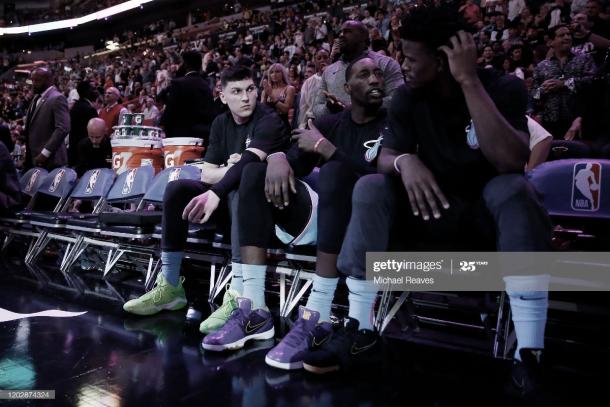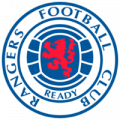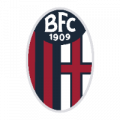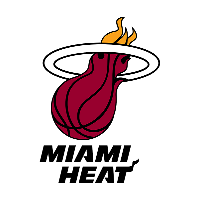
Miami Heat
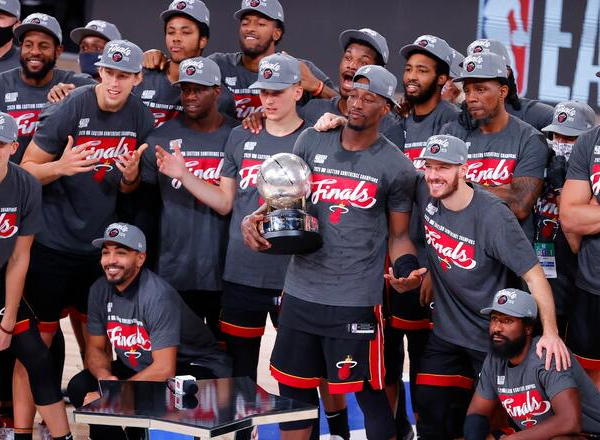
1950 Miami
The Miami Heat are a professional basketball team based in Miami, Florida. Founded in 1988, the team has a rich history of success and has been a key team in the NBA for over three decades.
Early History: The Birth of the Miami Heat
The Miami Heat were founded in 1988 as an expansion team, joining the NBA along with the Charlotte Hornets. The team's first season was a struggle, as the Heat finished with a 15-67 record, the worst in the NBA that year. However, the team's fortunes quickly turned around under head coach Ron Rothstein, who led the Heat to their first playoff appearance in 1992.
1988-1991, first years in the NBA
The Heat rolled out Kevin Edwards, Grant Long, Rony Seikaly, Rory Sparrow and Billy Thompson as their most common starting 5. These 5 players collectively averaged 59.9 points per game out of the 97.8 points scored on average by the team, last in the league. Miami lost the first 17 games of the season, won 2 of the next 7, and then again strung together 10 losses. Their longest winning streak was 3, at the end of March, when they beat Knicks, Spurs and Nets. Despite poor results athletically (they finished with a 15-67 record), Miami Arena was the 12th largest capacity arena (out of 25) in the league.
In the 1989 Draft they were taken 4th overall because of the poor results of the previous year, and selected Glen Rice. The rookie Rice was the third highest scorer of the team, with 13.6 points per game, playing 77 games in his first season, starting 60 of them. He was surpassed in scoring by Rony Seikaly, with 16.6 PPP (and was also the top rebounder with 10.4 per game) and Sherman Douglas, with 14.3 points per game (he was the team's best assist man with 7.6 assists per game). In the 1989-90 season they only added 3 wins to their previous record, so they amassed 18 wins (tied for 2nd worst record that year). That put them back at the bottom of their conference. They again had a good position in the Draft, and in 1990 they selected Willie Burton in the 9th position.
In the 1990-91 season the Heat experienced a slight but very insufficient improvement, as they finished with 24 wins, again very low in the standings. Despite the difficult first few seasons, Ron Rothstein continued to lead the team. Seikaly maintained his numbers and Rice went on to score 17.4 PPP and dish out almost 5 assists per game. Douglas increased his scoring to 18.5 points per game and was averaging 8.5 assists. The freshman Burton, mostly off the bench, was averaging 12 points.
In May 1991, Coach Rothstein left his post, and the Heat acquired the services of Kevin Loughery.
1991-95, Kevin Loughery leads Heat to the Playoffs
With the new coach on the bench and the contributions of Glen Rice, Grant Long (drafted by the Heat in the second round of the 1988 Draft), Rony Seikaly, Steve Smith (as a rookie) and Willie Burton, the Heat finally managed to see their name included among the 8 chosen in their conference to play in the Playoffs, with 38 wins to their credit. Despite this, they fell in the first round to Chicago 3-0, receiving a total of 135 points from a certain Michael Jordan, who would become NBA champion for the 2nd consecutive time.
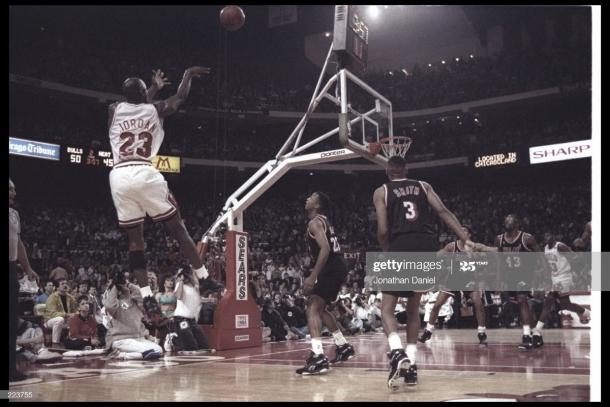
In the 92-93 season, Miami almost matched their previous record, which they subtracted two wins. A mediocre 36-46 was not enough to get them into the postseason, even though Rice (19 PPP starting every game) and Rony Seikaly (double-double average with 17.1 points and almost 12 rebounds per game) were still a good pair, and they continued to be supported by Grant Long, who averaged 14 goals in the 76 games he played. Steve Smith (drafted in 1991 from Michigan State), although he only played 48 games, contributed 16 points on average. Miami was not consistent, although at one point in the season (between the end of February and the beginning of March 1993) they had 6 consecutive victories. On the other hand, out of the last 7 games they won only one (in overtime, against Washington, with a magnificent Grant Long who scored 31 points and grabbed 10 rebounds), and all the games they lost were against teams from the East, which undoubtedly affected their chances of getting into the Playoffs.
Loughery's boys had a bad start to the 93-94 campaign, losing 6 of the first 9 games. Despite this, they managed to bounce back (although they lost 7 games in a row in January) thanks to a good run of form that they maintained from the second half of February until mid-March 1994. Glen Rice once again led his team with 21.1 points per game, missing only one game all season. In addition to the usual accomplices, Steve Smith, Rony Seikaly and Grant Long, there was Brian Shaw, who added 9 points on average, and Harold Miner, who contributed 10.5 PPP. Although the Heat finished the season with poor results (4-6 in the last 10 games of the season), they managed to finish with a positive balance of 42-40, which gave them the 8th place in the East in the Playoffs. In doing so, they faced the best record in their conference, which was held by the Atlanta Hawks. The Heat won the first game by five points, lost the second (by 18) and won the next by a 4-point margin, so a win in Game 4 would send them through. That game, which was played on the Heat's home court, was dominated by the Hawks virtually in its entirety. The Heat could only tie the third quarter at 19, losing the other three. Atlanta won by 14 points, thanks to a very inspired Mookie Blaylock who scored 29 points with 6 of 10 three-pointers, shielded by Danny Manning, who contributed with 26 points and 7 rebounds. Therefore, the playoffs went to a fifth game that the Hawks took at home, again with a magnificent Blaylock (13 points, 18 assists and 4 steals) and the scoring of Kevin Willis (24) and Danny Manning. The Heat suffered from physical fatigue, as Loughery overused 8 players during the playoffs, with Willie Burton, Matt Geiger, Harold Miner and Keith Askins barely missing. Thus, Miami's postseason once again ended on a short run.
For the 94-95 season the Heat lost Brian Shaw, who signed as a free agent with the Magic, and in November they cut Willie Burton, traded Seikaly to Golden State, and also traded Grant Long and Steve Smith to Atlanta in exchange for Kevin Willis and a 1996 1st round pick. The team, still led by Glen Rice, could not find the consistency needed to be competitive: out of the first 20 games they lost 14, and the direction the team was taking did not bode well. Miami won only 5 games in January, and on February 14 a change of coach took place; Loughery left his place to Alvin Gentry, who finished the season 15-21, for a final balance of 32 wins in 82 games, insufficient to aspire to the playoffs.
1995, Pat Riley, Hardaway and Mourning
In September 1995, Miami acquired the services of Pat Riley, who served as both President and coach, beginning in the 95-96 season. The Heat traded Matt Geiger, Khalid Reeves and Glen Rice to Charlotte in exchange for Alonzo Mourning, LeRon Ellis and Pete Myers. Mourning immediately threw the team on his back, and the Heat won 12 of the first 20 games. Mourning produced all season at a high level, averaging 23.2 PPP and 10.4 rebounds per game, and with the signing of Tim Hardaway in February Miami gained a great passer (Hardaway averaged 10 assists/game this season with Miami in addition to 17 points). With this great duo and with good secondary players (Bimbo Coles, Billy Owens, Rex Chapman, Kevin Willis), Miami completed a good last stretch of the season, finishing 15-8 since March 5. Thus, they had a 42-40 record that, as eighth in the East, pitted them against the 72-10 Bulls in the first round of the Playoffs. They were swept 3-0, losing the games by 17, 31 and 21 points. Despite this, they fell to the historic champion Bulls with the best regular season record.
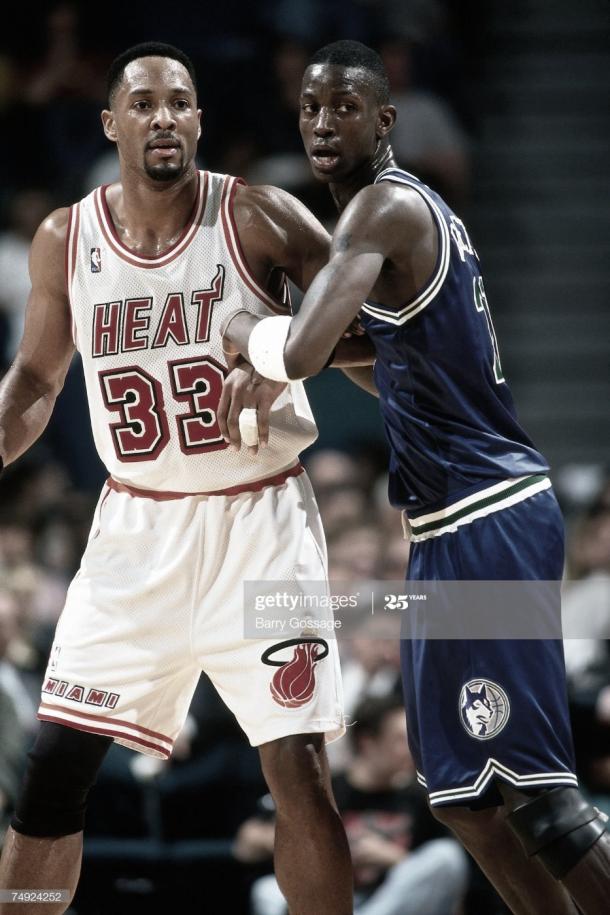
96-97
This season, Riley's charges got off to a tenacious start, only to reach their 10th loss of the season when they had already won 25 other games. Hardaway (20.3 PPP and 8.6 APP) and Mourning (19.8 PPP and 9.9 RPPP) were a great duo that, with the right backups, did a lot of damage. They also had the addition of Jamal Mashburn, who arrived in February 1997 from Dallas in exchange for Danilovic, Müursep and Thomas. The Heat finished second in the East with 61 wins, just behind the fierce Bulls (69-13). In the Playoffs, they struggled to get past Orlando (3-2) in the first round, again found it difficult to win in the conference semifinals against the New York Knicks (4-3), and were unable to give more than enough to challenge the Bulls for the East championship, which they won in 5 games. The only game Miami won featured Mourning (25 points, 7 assists) and Mourning (18 points and 14 catches).
97-98
The Heat returned to second place in the East behind the Bulls, who did not let up. Hardaway played 81 games, while Mourning was not so consistent: the center only played 58 games, but he averaged almost a double-double, with 19.2 PPP and 9.6 RPP. Jamal Mashburn played a little more than half of the games (48), scoring an average of 15 points. The Heat confirmed themselves as a more solid team, and were able to string together 10 consecutive victories in the month of February and 7 in the second half of March. With a final record of 55-27, they faced Patrick Ewing's Knicks in the first round of the Playoffs. Miami won the first meeting comfortably 94-79, but dropped the second at home 86-96. They won the first game at the Garden (the third in the series), but dropped the next two and thus the playoffs.
98-99
This season did not start until February 1999 because there was a lockout due to the disagreement between players and franchises to negotiate a new CBA (Collective Bargaining Agreement). As a result, the schedule was reduced to 50 games. Riley's men won 33, so they finished on top of the East, with the same victories as Orlando and Indiana. Again, they crossed paths with the Knicks in the first round of the playoffs and had no better luck than the previous year; they fell in 5 games, managing to win the 2nd and 4th, and losing the final one by one point, after Allan Houston's decisive basket.
99-00
The core of Hardaway, Mourning and Mashburn continued to perform well this season, and had the secondary pieces of Dan Majerle, PJ Brown and Voshon Leonard. Miami again made a good start to the season, winning 15 of their first 20 games. They went into the February break (for the All-Star break) with a 30-17 record, which went all the way to 52-30 at the end of the season. They were the 2nd best record in the East behind Indiana, and that put them up against the seventh-ranked Pistons in the East in the first round of the Playoffs. Miami swept Detroit 3-0, although they narrowly won (82-84) the second game, in which all the starters scored 10 points or more. In the conference semifinals they played again against the Knicks, who managed to take the series to Game 7, as Miami could have won in Game 6, which the Knicks won 70-72 after a second-half comeback. Miami let the final game slip away, as the Knicks went up 83-82, and missed shots by Mashburn, Hardaway and Weatherspoon doomed Riley's to fall again.
00-01
Although Miami had players of a certain age such as Tim Hardaway (34) and Alonzo Mourning (30), and the signings of AC Green (37) and Cedric Ceballos (31), they returned to the top half of the league. The team traded PJ Brown, Rodney Buford, Tim James, Jamal Mashburn and Otis Thorpe to Charlotte in exchange for Ricky Davis, Dale Ellis (who was later cut), Eddie Jones and Anthony Mason (the latter two became the team's leading scorers at 17.4 PPP and 16.1 PPP respectively).
With a 50-32 balance that placed them 3rd in the East, they played again in the postseason. Their opponent was Charlotte Hornets, who led by Mashburn and Baron Davis swept Miami 3-0. The team coached by Riley had been consistent for several seasons, but could not get far in the Playoffs.
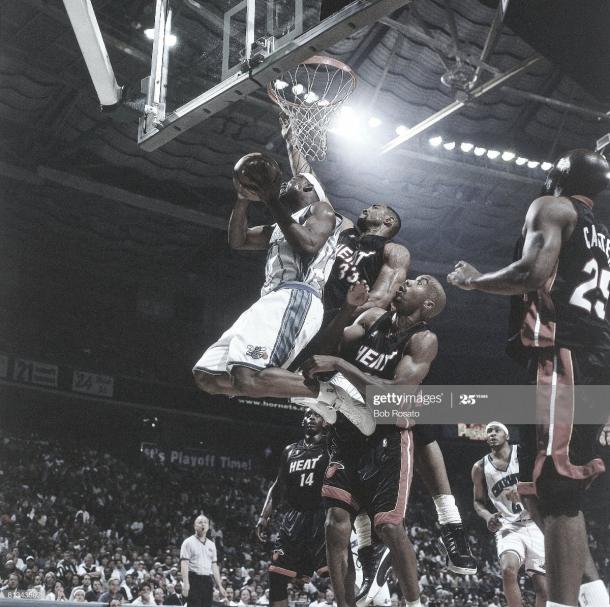
01-02
For this season, the Heat signed LaPhonso Ellis, Kendall Gill, traded Hardaway to Dallas for a draft pick, and also acquired veteran Rod Strickland. With an already veteran team, and noticing the absence of Hardawa and Mason, Mourning and Eddie Jones could not work the miracle. The Heat lost 16 (12 in a row) of their first 20 games, and the tone did not improve as the games went on. Miami finished the season with 36 wins, far from the Playoff spots. In the 2002 Draft they selected Caron Butler (10th pick) and Rasual Butler (2nd round).
02-03
This was a season in which the Heat were looking to continue rebuilding, and after the absence of Mourning (kidney problems) the leaders of the team were Eddie Jones, rookie Caron Butler, and Brian Grant. These three were the only players to score more than 10 points per game for the Heat. They again got off to a poor start, unable to string together wins, and went into the February break with a 17-32 record. This record led to a 25-57 finish, which plunged them to the last places in the East. Thanks to this, with the 5th pick of the 2003 Draft, they selected Dwyane Wade.
03-04, the Wade era begins
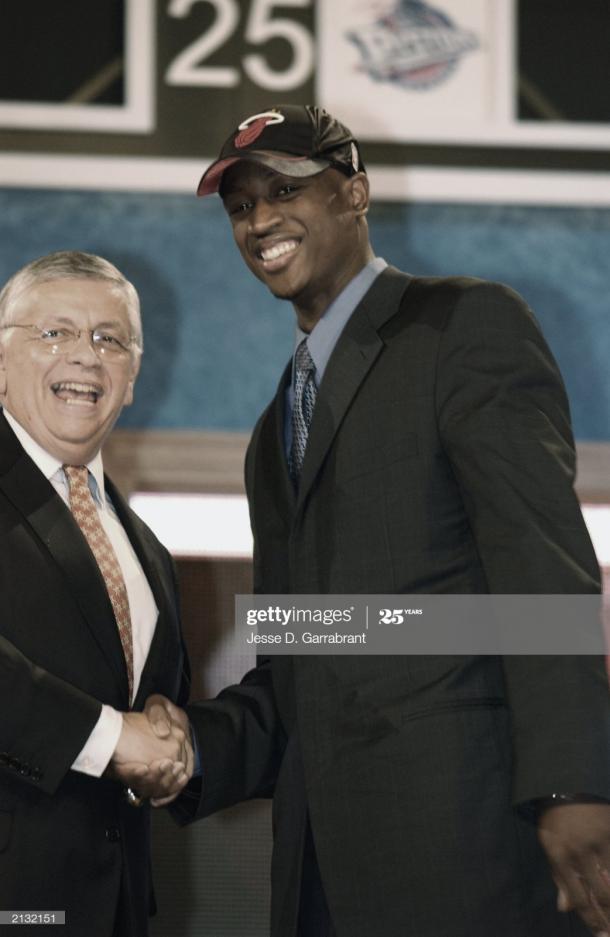
With the arrival of young Wade came a change on the bench, and Pat Riley was replaced by Stan Van Gundy. Udonis Haslem, Rafer Alston and Lamar Odom also arrived. Despite starting the season with 7 straight losses, the Heat rebounded, and with 12 wins in 15 games in March managed to clinch a Playoff berth. With a final record of 42-40, the Heat of Wade, Eddie Jones, Odom and Alston faced the Hornets (relocated to New Orleans) in the first round. It was an exciting series that went to game 7, which the Heat took thanks to a good performance by Caron Butler (23 points on 10/18 shooting, plus 9 rebounds), supported by Lamar Odom and Brian Grant, 16-9 and 14-9 points and rebounds respectively. In the conference semifinals their opponent was the Indiana Pacers, led by Metta World Peace and Jermaine O'Neal. After a 2-2 draw, Indiana did their homework at home, and took the playoffs in Game 6 winning at the AmericanAirlines Arena, 73-70, despite Wade's 24 points and Odom's 22.
04-05, Shaq arrives
In the second year of the 'Wade Era' Mourning returned after recovering from kidney problems, and Caron Butler, Lamar Odom and Brian Grant left for the Lakers in exchange for Shaquille O'Neal. Shaq's duo with Wade, despite the center's veteran status (32), proved to be very profitable. They racked up 14 straight wins in December, and between February and March the Heat won 21 games and lost just six, propelling them to the top of the Eastern Conference with a 59-23 record. Wade averaged 24.1 points and 6.8 rebounds during the season. In the Playoffs, they swept the New Jersey Nets of Vince Carter and Jason Kidd 4-0 in the first round. Wade scored 32, 17, 22 and 34 in the series to close out the playoffs. In the East Semifinals they also rolled over the Wizards 4-0, with a stellar Wade in the final game, scoring 42 points on 13/22 shooting. In the Eastern Conference Finals they faced the Pistons, a level opponent that was 2nd in the East in the regular season, and won the NBA the year before. Miami reached the 5th game 3-2 up, but in the 6th game (which Wade did not play) they were defeated by the Pistons, 66-91. In the 7th and final game, with Wade back, the Heat could not contain the Pistons; despite 20 points from 'Flash' Wade and 27 from Shaq, Detroit won 88-82 and left the Heat without Finals.
05-06
Antoine Walker and Jason Williams came to the franchise as part of a five-way trade that sent Eddie Jones and Rasual Butler, among others, out of Florida. They also signed 37-year-old veteran Gary Payton, who played 81 games, 25 of them starts. After a mediocre start (11-10) to the season under Van Gundy, Pat Riley returned to his previous coaching job and led the team for the remaining games. Under Riley, the Heat went 41-20, with 15 wins in 16 games between February and March. With a final record of 52-30, Miami was able to place 2nd in the East behind the Pistons. In the first round they faced the Bulls, whom they beat 4-2, winning the last two games by 78-92 and 113-96. In the East semifinals, against the Nets, they lost the first game 100-88, with a great game by Kidd, Carter and Richard Jefferson. After that loss they won the next four, winning the last one agonizingly by 105-106, with a steal by 'Flash' on a pass from Kidd that certified the victory. In the East Final they faced the Pistons again, but this time the Heat took the upper hand; they won the first game with Wade scoring 25 points with 9/11 shooting, and lost the second by 4. They won the next two (83-98 and 78-89), but didn't close the playoffs in the 5th. They didn't let the opportunity slip away in the 6th, and with a 78-95 win (powered by Shaq's 28 points and 16 rebounds and Wade's 14 points and 10 assists) they were able to reach the NBA Finals. They lost the first two games against Dallas, which was led by Dirk Nowitzki, who in the second game scored 26 points and 16 rebounds. Miami bounced back and won both games at home (in the 3rd game Wade scored 42 points and 36 in the 4th game). The 5th game, played at Miami's home, had an agonizing end in which the Heat won 100-101, with crucial actions of Payton and Wade. Game 6 also had high doses of emotion, and three Miami players signed a double-double of points and rebounds to secure the victory; Wade (36-10), Udonis Haslem (17-10) and Antoine Walker (14-10). The game ended 95-92 for the Heat, and with this victory 'Flash' Wade earned his first Heat ring.
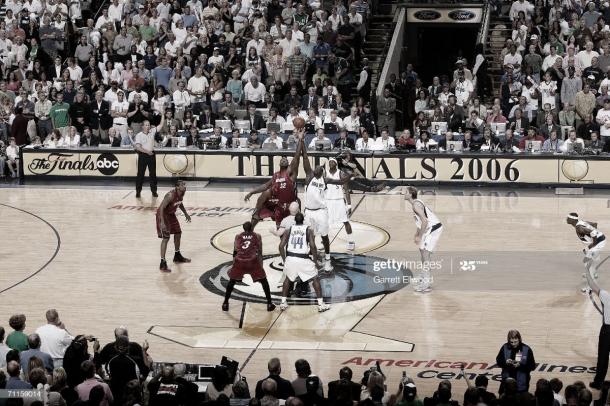
06-07
After being crowned NBA champions, the Heat did not live up to the previous year, but still managed to get into the Playoffs as fourth in the Eastern Conference with a 44-38 record. Shaq and Wade continued to perform this season, and Mourning continued to play despite his 36 years. Miami faced in the first round against the Bulls, led by Luol Deng and Ben Gordon, whom they could not beat. They fell by 5 in the first game (in which Deng scored 33, Gordon 24 and Andres Nocioni 17) and could not get their heads up in the following games, losing by 18 in the second, by 8 in the third (despite Wade and O'Neal combining for 51 points) and by 13 in the fourth and final game (despite Wade's double-double of points and assists, 24-10).
07-08, Wade's injuries and O'Neal's departure
During this season, Wade missed the last games of the season, due to a dislocated left shoulder and a rupture in the ligamentous tissue of the Labrum. During the 51 games he played during the season he averaged 24.6 PPP, being the Heat's leading scorer. The team noticed his absence, and even though Shaq played the first half of the season (33 games), because he was later traded for Shawn Marion (who played 16), Ricky Davis played the entire season and Jason Williams played 53 of his 67 starts, the Heat did not have a good enough record. Although they had signed a big name in Anfernee Hardaway and with Mourning still on the team, they were already far from their best and far from their physical best. Miami finished with a 15-67 record, which plunged them to the last position in the East, having accumulated 26 losses in 27 games between December 2007 and February 2008. In June 2008 they drafted Michael Beasley and signed Mario Chalmers.
08-09, Spoelstra takes the bench
For this new season Erik Spoelstra, who was Riley's bench assistant, took over as head coach. They signed James Jones and Jamaal Magloire, who were free agents, and after signing Shaun Livingston in October they traded him in January. In February, they acquired interior Jermaine O'Neal in exchange for Shawn Marion and Marcus Banks. Wade was already recovered, and that season he played 79 games, scoring an average of 30.2 points per game, which made him the league's leading scorer. Supported by Beasley, Haslem, Chalmers, and the succession of Marion and O'Neal, 'Flash' once again led his team to the Playoffs. Although they did not string together many wins in a row, they did not sink into a prolonged losing streak, and with a 43-39 they finished in 5th place in the East. They faced the Hawks in the first round, who had home-field advantage. Atlanta easily beat the Heat in the first game, 64-90; only Wade (19) and Beasley (10) scored in double figures for Miami, while Atlanta had the entire starting five. However, Miami managed to win the second game, thanks to Wade's 33 points, and extended the streak to the third game, which they won with a wide margin by 78-107, in which Wade (29 points, 8 assists) and Jermaine O'Neal (22 points, 10 rebounds) stood out. Atlanta tied the series again in Game 4, winning 81-71, and took advantage in Game 5 by winning 91-106 after a strong second quarter in which they outscored Spoelstra's team by 19 points. The Heat avoided elimination in Game 6 after winning 72-98 with 41 points from Wade, but finally fell in the final game by 78-91, in which the architects of the Hawks' victory were Joe Johnson (27 points and 5 steals) and Josh Smith (21 points and 9 rebounds).
09-10
Miami traded Mark Blount to get Quentin Richardson, who started 75 of the 76 games he played. He joined the core of Wade (26.6 PPP this season), Beasley and Jermaine O'Neal, and averaged nearly 10 points and 5 assists per game. The point guard position alternated between Chalmers, Carlos Arroyo and Rafer Alston (who went on to play 25 games). Miami finished the season strong, and from the beginning of March until the end of the season in mid-April, they won 18 games and lost 4. Again fifth in the East, they faced the Celtics in the first round. Miami lost the first three games (the second in a big way, 77-106, with a stellar Ray Allen), and won the fourth 92-101 with a stellar Wade who scored 46. The Heat fell in the fifth game 86-96, and were eliminated by the Celtics, who would be runners-up in the league after being beaten by the Lakers.
10-11, the 'big three' reunites
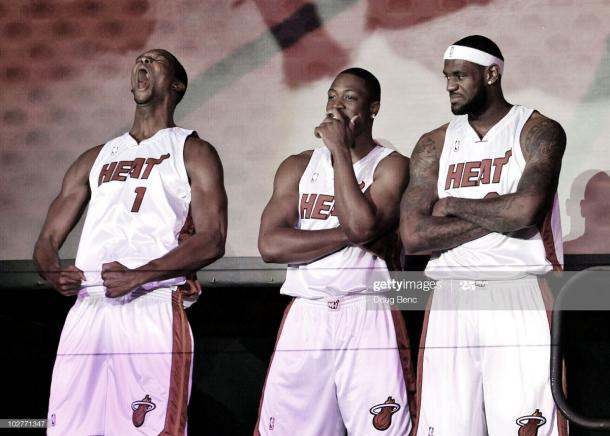
In the summer of 2010, the Heat turned the league upside down: they managed to reunite Dwyane Wade with LeBron James and Chris Bosh by only getting rid of several future draft picks. In addition, they signed Mike Miller, Zydrunas Ilgauskas and Juwan Howard, and sent Michael Beasley to Minnesota in exchange for a 2011 second-round pick and cash. With this 'big three', the Heat were a super team that immediately aspired to the top. Miami confirmed their lofty status when from late 2010 to early January 2011 they won 22 games (with streaks of 12 and 9 consecutive wins) and lost 2. They looked like a team to be feared and yearned to dominate the East. With a 15-3 record to finish the regular season, the team led by Spoelstra was second in their conference behind the Bulls of MVP Derrick Rose. Miami made it through the three Playoff series (first round, East semifinals and East finals) before advancing to the championship playoffs; they eliminated Philadelphia, Boston and Chicago 4-1. In the Finals they faced Dallas, led by a Dirk Nowitzki who was the leading scorer in three games in the series. Miami started with a win (in which LeBron went 24-9-9), but dropped their second game at home 95-93 (Nowitzki scored 9 points down the stretch to tip the scales). They also managed to win a game (Game 3, 88-86, in which Wade scored 29 points on 12/21 shooting, plus 11 rebounds) in Dallas, making it 2-2 heading into Game 5 of the series. Dallas took that game 103-112, winning three quarters, only dropping the first by 31-30. Despite LeBron James' 17-10-10 triple-double and the Heat's 40% in three-pointers, Dallas won driven by a better 68% shooting from distance and the 80 points they scored among their starters. Therefore, the Heat faced elimination on their home court in Game 6. In this decisive game, reserve Jason Terry was the top scorer with 27 points, which he achieved with a good efficiency of 11 hits on 16 shots, and was supported by Nowitzki (21 points and 11 rebounds) and J.J. Barea (15 points with 7/12). Miami's stars did not have their best night and that condemned the team: Wade did not score any three-pointers in 4 attempts and was left with 17 points and 5 losses (although he added 6 assists and 8 rebounds), LeBron scored 21 and dished out 6 assists but lost 6 turnovers and had a +/- of -24 on court, and Bosh contributed with 19 tallies and 8 rebounds. Dallas started the second half with a 2-point lead, and never trailed again, finishing the game and the championship 105-95.
11-12, first championship of the 'big three' against Oklahoma
This season, shortened to 66 games due to the lockout, the Heat were back in the game. LeBron James took the helm of the team, and with his averages of (points-rebounds-assists) 27.1-7.9-6.2 he was proclaimed MVP of the season. Despite not being a particularly three-point shooting team (only Mike Miller and James Jones were above 40% shooting), they stood out for their ease in scoring and an equal or better performance on defense. Wade and Bosh scored on average 22 and 18 points respectively, forming an offensive 'big three' of stellar caliber. From January 17 until the All-Star break at the end of February, Miami won 19 games and lost only 3; with a shortened schedule this streak helped them to occupy the top half of the East. At the end of the season they finished second behind the Bulls, and in the first round of the Playoffs they faced the Knicks, whose star was Carmelo Anthony. Miami did not meet much resistance (they won the first game by a margin of 33 points) and won 4-1, sealing the playoffs at home 94-106 with a great team effort. In the conference semifinals they played against the Pacers, a slightly stronger side with veterans like David West and Danny Granger, and young star Paul George. Despite being a better opponent, LeBron took control of the series, and after dropping the second and third games, he led his team to win the next 3 and finally eliminated Indiana 4-2 (Wade in the last game had 41 points and 10 rebounds). In the East finals they faced Boston, who had left Atlanta and Philadelphia on the road. Both Miami and Boston won their two home games, and the 5th game back in Miami went to the Celtics by 94-90, despite the 30 points scored by James. Game 6 could have been the definitive game but the Heat worked to force the opposite; after a first quarter in which they outscored Boston 26-16, they kept up the intensity (the Celtics were not ahead on the scoreboard for 2 minutes in total), and with another great game from LeBron (45 points and 15 rebounds) they tied the series after winning 98-79. The deciding game was played in Florida, and even though Boston's starting five scored over ten and Rondo had a triple-double, they were outplayed by the Heat. Miami played an excellent last quarter in which they scored with ease, and also defended with intensity; the last quarter started with a tie at 73, and the game ended 88-101 for Miami, with 28 points distributed among the 'big three'. The only team that separated them from the ring were the young Oklahoma City Thunder, with a young and electric Kevin Durant and Russell Westbrook. The Thunder took the first game, buoyed by Durant's 36 points (4/8 three-pointers) and Westbrook's 27-8-11 (points, rebounds, assists). Miami got their act together and won the second by 4 points thanks to the performances of James, Wade, Bosh and Battier. From Game 3 onwards, at the Heat's home, the series became very uphill for the Thunder, and LeBron led his side to two more wins (with 29 and 26 points). Miami had the opportunity to close the series at home in Game 5 and did not waste it; with a brilliant third quarter and the emergence of sharpshooter Mike Miller (he scored 7 three-pointers in 8 attempts) the Heat took the victory and the championship on June 21, 2012 in the 'big three' era of James, Wade and Bosh.
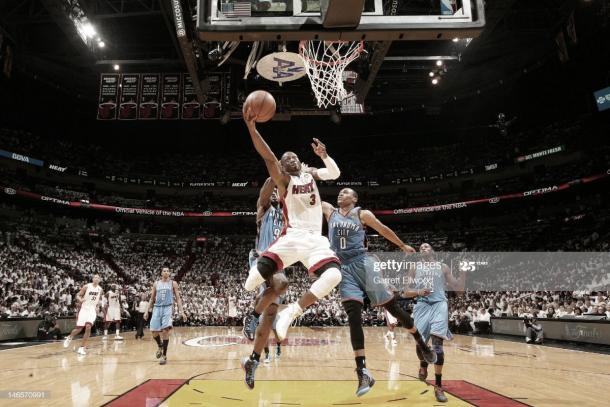
12-13, Miami repeats against San Antonio
The Heat, already a 'superteam,' added sharpshooter Ray Allen to their roster for this season, and retained their core from last season. Between February 3 and March 25, the Heat won all of their games, resulting in a streak of 27 straight victories, the third-best mark in the NBA. Following that spectacular tally, they won 10 of their last 12 regular-season games. They reigned the East at 66-16, and LeBron was again MVP, averaging 26.8-8-7.3. They swept their first-round opponent, the Bucks, 4-0; the smallest point margin they had was 8 points in Game 2. In their conference semifinals they faced the Bulls, who won the first game with an inspired Nate Robinson who scored 27 points. Miami took revenge in the second game, in which they crushed the Bulls 78-115 with a 60% shooting efficiency. Spoelstra's team did not take their foot off the gas, and won the third (104-94) and the fourth (88-65), in which they left the Bulls in a ridiculous score. In a thrilling fifth game, despite the efforts of Nate Robinson, Jimmy Butler and Carlos Boozer, the Heat defeated Chicago 91-94; Miami started the last quarter trailing by 8, but thanks to a good run by Battier and contributions from Norris Cole, LeBron and Wade they made it through. In the East final they met the Pacers, who had experienced a remarkable improvement. Miami won the first game in overtime 102-103, with a winning basket by LeBron James. Indiana won the second with strong performances from Paul George and Roy Hibbert, but Miami rallied and comfortably won the third game by 18 points. The Pacers managed to tie it up in Game 4 with a solid game from their starting five, led by Hibbert, who scored 23 points and grabbed 12 rebounds. Back in Miami, the Heat defended their home court and cruised to a 79-90 win, fueled by a third quarter in which they dried out Indiana and scored with ease (13-30). Although they could have ended the series in Game 6, they did not, as the Pacers pulled out the claws and with Paul George leading the way made it 3-3. Miami played Game 7 at home, and with a very good second quarter and 32 points from LeBron, they managed to win. In the Finals, the San Antonio Spurs were waiting for them, more rested because they swept the Grizzlies to become champions of the West. The Heat lost the first game by 4 points. Miami recovered, winning the 2nd game, in which the top scorer was Mario Chalmers with 19 points. The Spurs did not spare the third game at their AT&T Center, annihilating Miami 77-113; Miami's stars did not perform at their best and San Antonio had two unexpected protagonists: Danny Green scored 27 points with 7/9 in three-pointers, and Gary Neal scored 24 points with 6 three-pointers scored in 10 attempts. However, the Heat did not put their heads down and took Game 4, with LeBron and Wade combining for 65 points. The Spurs broke the tie again thanks to a great collective game, but LeBron and Ray Allen worked the miracle in Game 6 to not get eliminated; after starting the last quarter trailing by 7, James scored 15 points, and trailing by 3 with 15 seconds left, Chris Bosh caught a LeBron miss and found Ray Allen in the right corner, who launched a three-pointer over Tony Parker that forced overtime. Allen and James again excelled in overtime to make it 3-3 in the championship series. In the final game, played in Miami, LeBron scored 37 points and Wade followed him with 23 to win 88-95 and the championship. LeBron got (again, because against Oklahoma he also won it) the Finals MVP with 25-11-7.
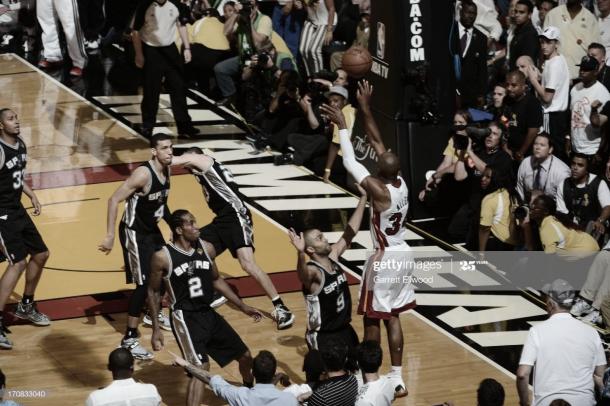
13-14, Spurs deprive them of the threepeat
After two consecutive championships, the Heat were looking for the threepeat. Dwyane Wade played only 54 regular season games, as he suffered from migraines and foot and knee problems. Despite the 'Flash's' irregularity, the Heat returned to the Playoffs for another year, finishing second in their conference with 54 wins. They rolled over the Bobcats 4-0, and played in the conference semifinals against Brooklyn. The team of veterans like Paul Pierce, Andrei Kirilenko and Kevin Garnett, led by Joe Johnson and Deron Williams, could only steal one game from the Heat. Miami won the first two, dropped the third and won the fourth and fifth (the latter by 2 points) to advance in the round. They repeated the conference finals against Indiana, who this time they beat in 6 games: after losing the first one in Indianapolis, they won three in a row, and let the 5th one slip away, falling 90-93 to an unleashed Paul George (37 points). The Heat started strong in Game 6 and led by James and Bosh beat Indiana. Again in the Finals, and again against the Spurs. This time it was a different story, because Wade's injuries hampered his performance and the Spurs played great basketball. San Antonio won their first game at home by 15 but the Heat stole the second game with a great LeBron, who scored 35 points. The Spurs won Game 3 111-92, capitalizing on Miami's 20 turnovers (7 by LeBron) and Leonard's 29 points. They managed to win again at the Heat's home to go 3-1, and the Spurs ended the series at home 87-104, evidencing that LeBron had not had the support of the previous year, and had also been defended by a skilled and uncomfortable player like Kawhi Leonard, who was MVP of the Finals.
14-15, LeBron's departure
After failing to win the three-peat and seeing that Wade's health had diminished his game, LeBron James decided to leave the Heat to return to the team that saw him grow up, the Cleveland Cavaliers. Miami signed Luol Deng, Danny Granger (later traded for the Dragic brothers), Shabazz Napier, Shannon Brown, and Hassan Whiteside. The hole LeBron left was a big one, and it was a difficult transition season for the Heat. They went from 54 wins to 37 this season, with no chance of making the postseason. In addition, Bosh missed half of the season because he was suffering from blood clots in his lungs, which further eroded the team's potential. In the 2015 Draft they selected Justise Winslow and Josh Richardson.
15-16
Miami recovered this season, and with Bosh back on the roster (although he played 53 games and did not play again due to new blood clot problems), they improved their previous result. On the inside they also had Whiteside and veterans Stoudemire and Haslem (and Chris Andersen who only played 7 games this season), and on the perimeter they had Wade, Goran Dragic and Joe Johnson (the latter was signed at the end of February and completed 24 games). After the All-Star break Miami completed 15 wins in the remaining 25 games, and finished the season with a 48-34 balance that gave them again access to the Playoffs. They struggled to beat the Hornets in the first round, 4-3; after winning the first two games at home (the first one comfortably by 91-123 and a great Luol Deng), Charlotte took the upper hand with three straight wins. That put the Heat on the edge of the precipice in a Game 6 that they managed to win with collective effort and three-point shooting. With the positive inertia after forcing the tie, they won Game 7 largely led by Goran Dragic. Although the Raptors had home-court advantage in the Eastern Conference Semifinals, they lost the first game to Miami; however, they gave Miami the game back, leaving the series 2-2 in Toronto. Canada won game 5 91-99, but Miami forced a tie in game 6 again with a great Dragic. In Game 7 the lack of three-point shooting and great performances by opponents Lowry and DeRozan sent the Heat home after a resounding 89-116.
16-17, Wade leaves Miami
After a tough loss in the Playoffs Dwyane Wade left for the Chicago Bulls, leaving Miami without its star for this season. Dragic, Whiteside, Josh Richardson, Tyler Johnson and Dion Waiters (who played 46 games because he had injury problems with his left ankle) tried to lead the Heat to success, but fell short. The team finished with a 50% winning season, 41-41, outside the top 8 in the East. In the 2017 Draft they picked 14th overall in the first round for Kentucky rookie Bam Adebayo.
17-18, Wade returns
After being traded from the Bulls and starting the season with the Cavaliers, the 'prodigal son' Wade returned to Miami in February after spending the first part of the season with Cleveland. Prior to that date (February 9), the Heat had won 29 of their 54 games. On the outside, Dion Waiters played 30 of the first 32 games of the season until he had to sit out the season after aggravating his already bad left ankle. Goran Dragic continued to lead the team with 31 years, averaging 17.3 points per game and almost 5 assists. 'The Dragon' had Josh Richardson (who played 81 games and averaged almost 13 points and 3 assists) and Tyler Johnson as his teammates. On the inside, rookie Bam Adebayo played much of the season and had 19 starts, finishing with an average of 6.9 PPP and 5.5 rebounds per game; Hassan Whiteside played 54 games as a starting center, in which he averaged a double-double of 14-11.4 points and rebounds. Canadian Olynyk, from the '4' position, contributed 11.5 PPP. After the addition of the Flash, Miami finished the second half of the season 25-12, for a 44-38 overall record. This record, which left them in 6th place in the East, pitted them against Philadelphia in the first round of the Playoffs. Miami lost the first game hard (by 27 points), but won the second 113-103 with 28 points from Wade. Joel Embiid returned to play for the 76ers in Game 3 (played in Miami), which Philadelphia won by 20. Miami lost again in Game 4 at home, despite Wade's 25 points and Whiteside's double-double. The 76ers returned home for Game 5 and closed out the playoffs winning 91-104 thanks to Redick's hot shooting and the power of Embiid and Simmons.
18-19, Dwyane Wade's last season
For this season Miami added Duncan Robinson, re-signed Derrick Jones Jr. and Justise Winslow, and signed Wayne Ellington as a free agent (although he would be traded after the start of the season along with Tyler Johnson to Phoenix in exchange for Ryan Anderson). Miami only won 7 of their first 20 games, but rebounded a bit and went 20-20 nearly halfway through the season. They continued to be close to 50% winning, but 5 losses in the last 6 games of the season led to a 39-43 finish that left them in 10th place in the East behind Charlotte who had the same number of wins. In June they had the chance to pick two players, who were Tyler Herro and Bol Bol (later sent to Denver). This was the last season for Dwyane Wade, who in his last home game (on April 9, 2019) against Philadelphia scored 30 points in his team's victory.
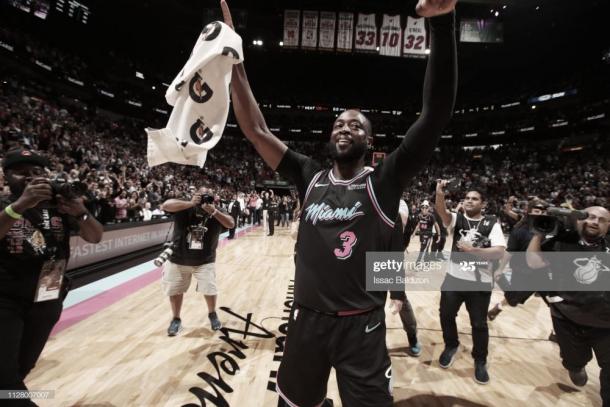
19-20, Jimmy Butler in charge of a young Heat.
In the summer of 2019 the Heat made several moves to bolster their roster; in July 2019 Miami managed to land shooting guard Jimmy Butler in a four-way trade in which they let Whiteside go to the Blazers and Josh Richardson to Philadelphia, the team Butler came from. The point guard took over the team, with support from youngsters Derrick Jones Jr. (22), Justise Winslow (23), Kendrick Nunn (24), Tyler Herro (20) and Bam Adebayo (22). Despite not being a point guard Butler was the top assist man that season (6.1 APP), and also the top scorer (20.2 PPP). Also playing important roles were interior players Meyers Leonard (27), Goran Dragic (33) and Jae Crowder (29). The Heat came into the All-Star break with a positive balance, and in their last games of the season before the season suspension (due to Covid-19) they had 5 wins in 7 games for a 41-24 record, which put them in 4th place in the East very close to mathematical qualification for the Playoffs. The group of young players with the leadership of Dragic and Butler has been a surprise in their conference, performing at a high level and fighting for home court advantage in a hypothetical postseason.
